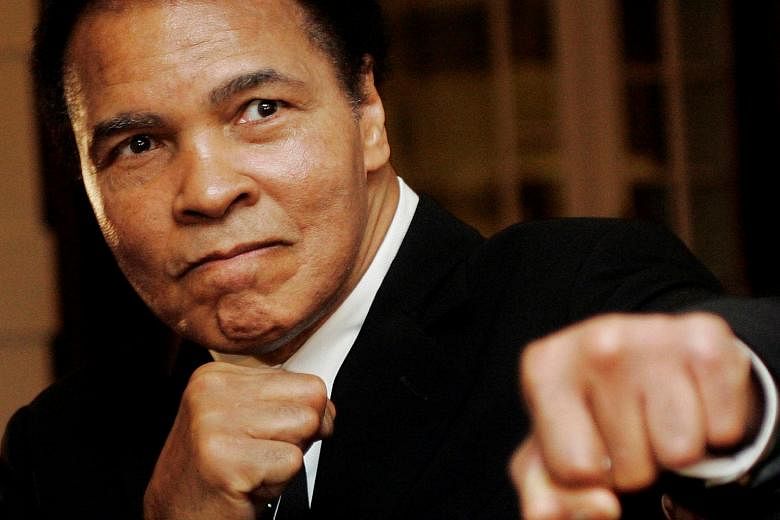Sport is in mourning and boxing is weeping. Ali has gone and it feels like a punch to the solar plexus. Who allowed this? He was not supposed to die because in our imaginations he could beat anyone. He out-fought Sonny Liston, Joe Frazier, George Foreman and even his own government, so why not time? But let us at least do this much now. Retire the nickname. Remove it from use. The Greatest forever can only be him.
To say "Ali" was enough. No first name, profession, or nationality was required, for he was unforgettable. He was the provocateur who said, "I've seen George Foreman shadow boxing and the shadow won," and the bully who taunted Joe Frazier as an "Uncle Tom". He was a childlike warrior in a dancer's body with an activist's heart, a narcissistic gleam, a clown's smile, an artist's rebelliousness and a talent as large as his mouth. Like him, let us defy convention today and not have a minute's silence: Ali talked through his life and so should we about him.
Ali is gone and yet he is embedded in our lexicon. Every time an athlete absorbs punishment and rebounds we'll say "rope-a-dope". Every time they dance we'll talk about "the Ali shuffle". Manila for us will never just be a place but shorthand for 1975, a brutal fight and Frazier lying in the darkness and saying: "Man, I hit him with punches that'd bring down the walls of a city. Lawdy, Lawdy, he's a great champion."
I first saw Ali as a teenager in my friend's house in Kolkata in the late 1970s. On a wall, on 8mm film, he fought, this man with an unblemished face whose sleight of hand involved a more bruising type of magic.
Almost everyone knew of this man who changed his name from Cassius Clay, his religion from Christianity to Islam and even his boxing style (after his three-year ban, he danced less and took more punches). He had four wives, won the heavyweight title three times and had innumerable tricks. As he said: "I'll hit Liston with so many punches from so many angles he'll think he's surrounded."
We knew of Ali even though there was no Internet and no YouTube. We'd hear our fathers talking of him, find him on a Life magazine cover or stumble across Neil Leifer's picture of him snarling over a prostrate Liston. We knew his legend long before we filled in the detail.
Ali lived in a newspaper's front pages, political pages, cultural pages and sports pages and his effect on us was staggering. When he won gold at the 1960 Olympics I wasn't even born and yet in Atlanta in 1996 when he stood there, shaking in the night as he lit the Olympic cauldron, I wasn't the only one crying in the stadium.
I was not even two years old when he won the heavyweight title and yet, like many others, my bookshelves are full of him. From novelist Norman Mailer to New Yorker editor David Remnick everyone had their say. In one book on him there are essays by a poet, a sister of charity and a comedian. In his early years he was not widely loved, in his later ones he was over-romanticised.
Ali has gone and more than a man has been lost. A time has vanished. He refused to be inducted into the US army and was banned for three years in his prime. Now they would count dollars but he measured himself by principle. He was far from a perfect man but in a harsh Twitter-world a man of such loud and complex personality would never survive. Maybe we will miss him because we understand that we will never see such an athlete again.
Roughly 25 years ago in a hotel in Kolkata I met a retired Ali. I have no photos as memory but I can't forget that shuffling, slurring man who epitomised both the beauty and tragedy of his art. Yet one thing from that day still makes me smile. I have been privileged to meet a cross-section of the world's greatest athletes, but only with Ali - I was in my 20s - did I appreciate the idea of aura. When he stood up, something unforgettable happened: He seemed eight feet tall.


